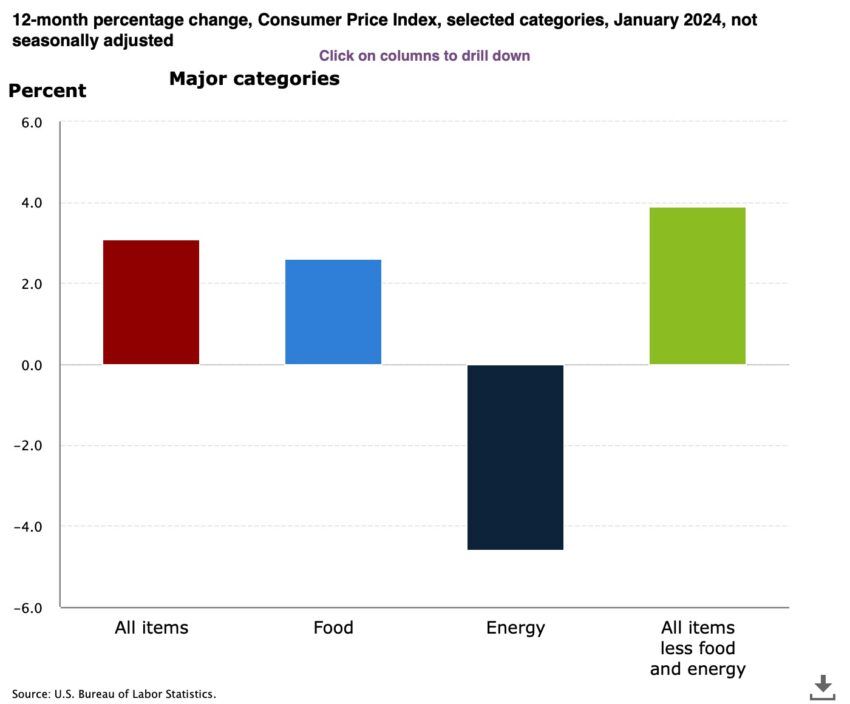These 8 Events in March Could Wreak Havoc on the Crypto Market
03/07/2024 05:30
Explore how events like the Fed's BTFP end, February CPI data, and Ethereum's upgrade in March could impact crypto market dynamics.
As the calendar flips to March, the crypto market is on the brink of facing potentially pivotal changes. Here’s a meticulously curated analysis of eight imminent events that could significantly sway the market dynamics, highlighting the interconnectedness of regulatory actions, economic indicators, technological advancements, and legal proceedings.
Each event is a thread in the crypto ecosystem’s larger tapestry, poised to weave stability or unravel volatility.
1. Federal Reserve’s Bank Term Funding Program
The Federal Reserve’s Bank Term Funding Program (BTFP) will stop making new loans on March 11. Established under Section 13(3) of the Federal Reserve Act, the BTFP was designed as a liquidity backstop for eligible institutions during periods of financial stress.
Its conclusion signals a shift towards normalization post-economic stress, with institutions continuing to have access to liquidity through the discount window. It will also reverberate through the banking sector, with indirect impacts on the liquidity and stability of the crypto market.
The adjustment in the interest rate for new loans to be no lower than the rate on reserve balances underscores a strategic alignment. It ensures the program supports its goals effectively until its expiration.
2. Release of United States February CPI Data
The Consumer Price Index (CPI) data for February, set to be released on March 12, provides a crucial measure of inflation. This data is pivotal for economic policy and investment strategies, as it influences the Federal Reserve’s decisions on interest rates.

Crypto markets often react sensitively to inflation signals. These can influence the Federal Reserve’s monetary policy decisions, affecting investor sentiment towards risk assets, including cryptocurrencies.
For instance, high inflation figures signal economic uncertainty, potentially leading to shifts in investment towards non-traditional assets like cryptocurrencies.
3. Ethereum’s Dencun Upgrade
Scheduled for March 13, the Ethereum network’s Cancun-Deneb upgrade, or “Dencun,” focuses on performance. It aims to enhance scalability, efficiency, and security through various Ethereum Improvement Proposals (EIPs), including EIP-4844 for proto-danksharding.
This upgrade is crucial for Ethereum’s roadmap towards mass scalability. It also signifies a leap in blockchain technology, making Ethereum more accessible and improving its utility across sectors like DeFi.
| Chain | Gas Fee Cost of a DEX Swap | Projected DEX Swap Cost After EIP-4844 |
| Ethereum Mainnet | $6.38 | $6.38 |
| StarkNet | $1.16 | $0.12 |
| Optimism | $0.38 | $0.04 |
| Arbitrum One | $0.26 | $0.03 |
| Polygon zkEVM | $0.24 | $0.02 |
| zkSync Lite | $0.21 | $0.02 |
The emphasis on scalability and efficiency through Layer 2 rollups and innovations like temporary data blobs in EIP-4844 can significantly impact Ethereum’s performance and user adoption.
Read more: Ethereum (ETH) Price Prediction 2024 / 2025 / 2030
4. FTX’s First Creditors’ Meeting
The first creditors’ meeting for FTX on March 15 aims to establish a Liquidation Committee as part of the official liquidation process. This meeting is crucial for stakeholders to understand the progress of the liquidation, the claims process, and the impact on the crypto market.
The formation of the Liquidation Committee and the information shared during the meeting could provide insights into the fallout from FTX’s collapse and future regulatory scrutiny.
5. NVIDIA’s GPU Technology Conference
NVIDIA’s GPU Technology Conference on March 17 is set to announce advancements in GPU technology, including the H200 and B100 models. These innovations, leveraging TSMC’s advanced nanometer processes, have significant implications for computational tasks, including crypto mining and valuation of cryptocurrencies reliant on Proof-of-Work (PoW).
GPU efficiency and capacity enhancement can influence mining economics, affecting the supply and operational costs within the crypto market.
6. Federal Reserve’s Interest Rate Decision
The Federal Reserve’s stance on interest rates, highlighted by Chair Jerome Powell’s remarks, is a barometer for economic policy direction. Interest rate decisions affect borrowing costs and sway investor sentiment towards risk assets, including cryptocurrencies.
The Fed’s approach to managing inflation while ensuring economic growth and employment stability is critical for market confidence.
“If the economy evolves broadly as expected, it will likely be appropriate to begin dialing back policy restraint at some point this year. But the economic outlook is uncertain, and ongoing progress toward our 2% inflation objective is not assured,” Powell said.
With the Federal Reserve’s meeting on March 20, the financial world will closely watch for any changes in interest rates. Such decisions directly impact the investment environment, affecting the attractiveness of cryptocurrencies as alternative investments in the face of rising or falling traditional asset yields.
7. SEC’s Fraud Charges Trial Against Do Kwon
The legal proceedings against Do Kwon, delayed due to extradition challenges, underline the regulatory scrutiny facing the crypto sector. Kwon’s trial for securities fraud, among other charges, reflects the legal complexities and the potential for regulatory outcomes to impact market perception for crypto entities.
The commencement of Kwon’s trial on March 25 is a reminder of the crypto industry’s regulatory risks and legal uncertainties.
8. Sam Bankman-Fried Sentencing:
The sentencing of Sam Bankman-Fried on March 28, following his conviction for defrauding FTX customers, marks a significant moment in crypto regulatory enforcement. It underscores the consequences of regulatory non-compliance and governance failures, potentially shaping future regulatory and market dynamics.
The outcome could influence future regulatory measures, investor trust, and the operational standards for crypto exchanges and platforms.
Read more: 10 Best Crypto Exchanges and Apps for Beginners in 2024
Together, these events form a mosaic of potential market-moving factors. Each carries weight, influencing investor sentiment, regulatory landscapes, and the technological evolution of the crypto market.
Trusted
Disclaimer
All the information contained on our website is published in good faith and for general information purposes only. Any action the reader takes upon the information found on our website is strictly at their own risk.